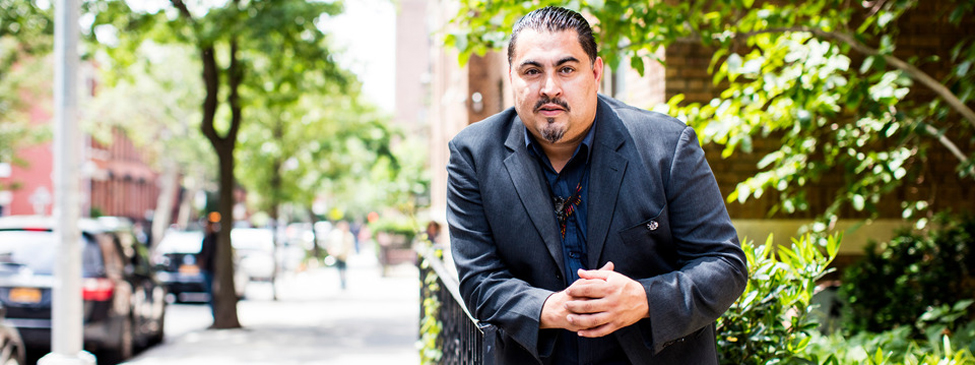Update: Applications for the 2018 Bridge Fellowship are open now through September 2nd.
César A. Cruz of Oakland, California is one of TNTP’s 2016 Bridge Fellows. During his fellowship, César seeks to explore how the way we see, label, and think of young men of color affect our approach to supporting them. César envisions an alternative education community to nurture students struggling in school, recent drop-outs, gang members, or young men trying to re-enter society post-incarceration. We sat down to learn more about his path to the Bridge Fellowship, and his dream to empower students who too often are written off as “thugs” or criminals.
Talk a little about your upbringing. What challenges did you face as a kid?
I felt like I grew up rich because I grew up with a ton of love from my grandparents. By age six, I was conscious that my dad had abandoned us, and my mother was not living with us. We were in a small town in Mexico and my mother was in the United States. I ended up reuniting with her a couple of years later. Then, I learned I wasn't so rich.
I moved from rural Mexico to Compton, California. We couldn't afford much. At school, kids made fun of my clothes and my accent. I was called poor; I was called dirty. I realized in order to fit in, I had to wear better clothes and learn the language. I didn't want to be the person they were describing. Only later did I realize I was going through a process called “subtractive schooling.”
There's a lot of research on Mexican kids going into U.S. schools and getting things subtracted from them: Our sense of identity, our indigenous language, our self-confidence, our awareness of our history and roots. I quickly became Cesar, not César. I wanted to be the perfect English-speaking Americanized citizen. But in reality I was undocumented, I still spoke mostly Spanish, and my family was poor. It took a while to get over this, but eventually I learned resilience. My family and I always found a way to face our challenges.
How did you become involved in education? When did you realize it is a career you wanted to pursue?
I realized I was good at talking to people, connecting with people, and working with kids. I fell into education through the back door of working in after-school programs. I started meeting kids who also didn't have a father and were looking for role models. I wanted to give the love that had been given to me to kids who weren’t getting it. I wanted to be a father figure—maybe the father figure I didn't necessarily have.
I fell in love with the possibilities in schools. I'm a believer in experimenting, in letting kids lead. That's where I found my passion: Trying new things with kids to get results. But even when I did that, I noticed I was not reaching the kids who carried heavy trauma and who were disconnected and disengaged. These were the kids who were called names like “thugs” and “gang members.” Sometimes, on the news, they were called “baby terrorists.” I realized I really wanted to help kids who had a lot of potential, a lot of leadership, but were demonized.
The Homies Empowerment Program is a gang-outreach program you helped found. Where did the idea for the program come from? How did you get it off the ground?
I was a teacher for close to 15 years in the Bay Area and every year, I ended up going to more funerals than graduations. I felt completely helpless. I realized I had to try something new. At the time, I worked at a continuation school. The school itself was a baby prison. There was a security guard at the front who checked everybody for weapons. There was barbed wire. No one was really teaching. I was working there with a friend who is another co-founder of Homies Empowerment, Lizbeth Gomez. We said, “This is criminal the way kids are being educated.”
The problem was everyone demonized the homie—the kid who grows up on the block or the kid who bangs. As a society, we say these kids are the problem in communities. But what Lizbeth and I were beginning to articulate is gangs themselves are not the problem. For some kids, gangs are family. For kids that never go to college, gangs are a fraternity or sorority. They're a place of belonging. They're a community. They provide rites of passage. They provide protection. They provide love. For kids that don't have that anywhere else, that’s a big deal.
We thought, what if we cooked up the best of gangs? What if we didn't demonize kids in gangs? We began teaching new courses after school: Ethnic studies, African American studies, Latino studies, knowledge of self. It caught like wildfire. We had kids who would cut school and then show up to an after-school Latino film class, because they were hungry to learn their history. After a year, we realized we were teaching kids who saw each other as enemies on the street. We decided to bring them together in a neutral home. A local YMCA let us use their space and every Wednesday night we had dinner and social time.
First, only 20 came, but it grew to hundreds. It was a way for kids in rival gangs to eat together, serve each other, listen to empowering speakers, and play sports. Eventually, we had kids develop projects to make Oakland better. One project was a breakfast program for undocumented day laborers. Kids from two rival neighborhood gangs came up with the idea and rolled it out. All of a sudden, they were on the news, and not because they were a suspect, but because they were making positive changes in their community.
In your proposal for the Bridge Fellowship, you mention part of what you want to do is change the labels we put on young men of color. Why is that important?
It’s easy to look at a homie as a thug or a gangster. It’s harder to look at them as someone with promise. But when you make that shift, you treat them differently. We have to reframe how we look at these kids. These are our brothers and sisters. These are street entrepreneurs who are resilient survivors. How do you tap into that entrepreneurial instinct and turn it into something positive?
There is one particular kid I think of. He was selling drugs at school. He was constantly getting kicked out of class. I realized I needed to spend time with his teacher in order for them to truly see this kid and not just his baggy pants. I helped the teacher look at this kid as a mathematician, and treat him like one. All of a sudden, the kid produced differently. He didn't get a 4.0, but he got a 2.7. Eventually, he got to a 3.0. That was big. This was a kid who had straight Fs. The shift registered with him.
What are your expectations for the fellowship?
I’m thankful a place like TNTP is giving this idea a shot because they believe kids on the margins matter. I want to figure out answers to big questions: How do we scale a program like Homies Empowerment? How do we get more resources? I want to build on the research I did while recently getting my doctorate at Harvard and grow so we have our own center, our own building, our own small community. I want to grow a new model of education for young people who have been thought of as less than. They get called everything except “promising,” “brilliant,” or “genius.” How do we change that?





